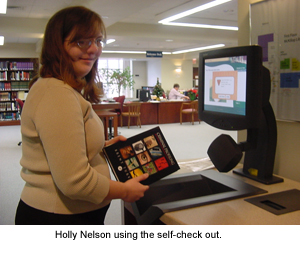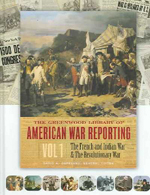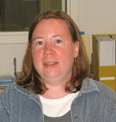 MEETING CHANGING LEARNING NEEDS MEETING CHANGING LEARNING NEEDSby Kathy Boyd
Recent articles in the Boston Globe, the Wall Street Journal, the New York Times, and discussion on National Public Radio have spotlighted the changing role of the academic library. The university's Ad Hoc Committee on Library Space Utilization has been meeting this semester to discuss how learning is taking place among today's students, and how existing spaces can be reconfigured to best serve these needs.
Committee members are looking in particular at the current use of space in the McKillop Library to discover whether changes can be made to best optimize the use of the building to serve the needs of today's students who are tech-savvy, multi-tasking, and enjoy learning in groups. An online survey has gone out this week to all current students to find out how they prefer to do their academic work; faculty and staff will be assessed later in the academic year regarding their teaching styles and space needs. These results will be used to discuss ways in which McKillop Library can be transformed into a vibrant learning hub of intellectual activity on campus.
|
|
|
TOP
|
by Olga Verbeek
Salve Regina University, as part of the HELIN Consortium, has become involved in an institutional repository project funded by the Davis Educational Foundation. An institutional repository can best be described as:
"…a digital archive of the intellectual product created by the faculty, research staff, and students of an institution and accessible to end users both within and outside of the institution, with few if any barriers to access."
Raym Crow. The case for institutional repositories: a SPARC position paper. 2002.
One of the major benefits of an institutional repository is that scholarly informational assets can be easily showcased in an electronic format.
-
Academic research can be widely and rapidly disseminated.
- The architecture of the repository allows for a wide variety of publishing types (e.g. articles, preprints, monographs, reports) as well as non-static files (e.g. sound and video files, datasets, images, and executable files)
- The repository is Open Archives Initiative (OAI) compliant and documents can be immediately found in Google and other web search engines.
- The repository provides full-text searching and usage statistics.
Salve's repository is called eScholar and currently contains the university's doctoral dissertations, the first issue of The Journal of Interdisciplinary Feminist Thought, selected Pell Honors Students' theses and one faculty and staff publication. Take a look at: https://escholar.salve.edu/.
The library is inviting faculty and staff to use the repository as a means to publish their scholarly output. Anyone with questions about eScholar can contact Olga Verbeek at x2281 or verbeeko@salve.edu.
|
|
TOP
|
|
CIRCULATION INSTALLS SELF-CHECK OUT TERMINAL
by Joe Foley
 The McKillop Library Circulation Department recently installed a 3M
Self-Checkout Terminal for library materials. This terminal is located directly in front of the Circulation Desk at the pillar outside the Bookends Café. The installation of this terminal is another effort by the Library to provide better, faster, and more efficient service. The McKillop Library Circulation Department recently installed a 3M
Self-Checkout Terminal for library materials. This terminal is located directly in front of the Circulation Desk at the pillar outside the Bookends Café. The installation of this terminal is another effort by the Library to provide better, faster, and more efficient service.
The distinctive V- shaped design of the kiosk makes placement of items for checkout more intuitive. It comes with an easy-to-use touch screen interface and provides the user with a printed receipt that gives the due dates of their items. The system processes books, videos, CD's and DVD's. With the increased use of the library this semester and the addition of Wheaton College to our HELIN Consortium this past summer, there is little chance that the new purchase will put any Work/Study Circulation Assistants out of a job! Our hope is that this new system will add a flexible option for our users in order for us to serve them better.
|
|
TOP
|

DATABASE SPOTLIGHT - SMITHSONIAN GLOBAL SOUND
by John Lewis
Smithsonian Global Sound from Alexander Street Press includes an extraordinary array of more than 35,000 individual tracks of music, spoken word, and natural and human-made sounds. Users can browse by musical instrument, geographic area, or cultural group. It includes the published recordings owned by the non-profit Smithsonian Folkways Recordings label and the archival audio collections of the legendary Folkways Records, Cook, Dyer-Bennet, Fast Folk, Monitor, Paredon and other labels. It also includes music recorded around the African continent by Dr. Hugh Tracey for the International Library of African Music (ILAM) at Rhodes University as well as material collected by recordists on the South Asian subcontinent from the Archive Research Centre for Ethnomusicology (ARCE), sponsored by the American Institute for Indian Studies.
Global Sound covers many musical genres including American Folk, Blues, Bluegrass, Old Time Country, American Indian music, World, Jazz, Classical & Broadway, and Spoken Word & Sounds. A personal favorite is Portuguese Fado music including recordings by the legendary Amalia Rodrigues. With Global Sound you can play a track, play an entire album, read the liner notes and view the cover art!
Global Sound, along with all the other library databases, can be accessed on the McKillop Library home page at https://mckillop.salve.edu/databases_a-z.cfm.
| 
THE GREENWOOD LIBRARY OF AMERICAN WAR REPORTING
by John Lewis
The Reference Department recently purchased the Greenwood Library of American War Reporting (GLAWR). This eight volume set consists of first person and news accounts of all the conflicts the United States has been involved with starting with the French and Indian Wars through the Iraq Wars and the War on Terror. This set offers a broad and deep overview of how the American press has reckoned with battle. It chronologically presents reports from over 2,000 newspapers and magazines, as well as radio and television, on all the major American conflicts.
GLAWR gathered its material from newspapers, magazines, radio, and television. The selected articles and transcripts are presented unabridged, arranged by war in eight volumes. It includes contributions from many notable American authors such as Ernie Pyle, Stephen Crane, Ernest Hemingway, Marguerite Higgins, Edward R. Murrow, Margaret Bourke-White, John Hersey, William Lloyd Garrison, Walter Cronkite, David Halberstam, and Bob Woodward.
Articles of local interest include an Account from the Newport Mercury of April 17th, 1759 on French Peace Proposals, an article from the Mercury of May 8th, 1775 on the Battle of Lexington and Concord, and Nathaniel Greene's Report to the Army of Benedict Arnold's Defection.
This is an amazing collection for any student or faculty member interested in first person history or journalism. The Collection can be located in the New Reference Book Cart outside the Reference Office.
|
|
|
TOP
|
|
FROM THE ARCHIVES
By Maria Bernier
 Before I started my new job as the University Archivist here in the middle of September, I didn't know much about Salve Regina except that it had a gorgeous location and was a popular school for students from Westerly, where I live. In the past few months, though, I've learned quite a bit about the university through my work with the archival collections. For instance, while preparing for visits by CHP students, I read through the records on buildings owned by Salve and saw how the use of those structures has changed since they were first built. In response to an inquiry from a professor at the University of Connecticut, I looked for references to a 1983 conference here called "Facing Apocalypse" that was planned in part by our own Professor James Hersh and featured several notable speakers, including the poet Denise Levertov. When I receive batches of course syllabi from the Undergraduate Studies office and add them to the collection of other syllabi dating back to 1984, I get to see what kind of classes have been offered over the years. Before I started my new job as the University Archivist here in the middle of September, I didn't know much about Salve Regina except that it had a gorgeous location and was a popular school for students from Westerly, where I live. In the past few months, though, I've learned quite a bit about the university through my work with the archival collections. For instance, while preparing for visits by CHP students, I read through the records on buildings owned by Salve and saw how the use of those structures has changed since they were first built. In response to an inquiry from a professor at the University of Connecticut, I looked for references to a 1983 conference here called "Facing Apocalypse" that was planned in part by our own Professor James Hersh and featured several notable speakers, including the poet Denise Levertov. When I receive batches of course syllabi from the Undergraduate Studies office and add them to the collection of other syllabi dating back to 1984, I get to see what kind of classes have been offered over the years.
There is a surprisingly broad range of information preserved in the University Archives. This valuable resource is open to all researchers Monday through Friday from 9:00 to 4:00. Please call (x2276) or e-mail maria.bernier@salve.edu in advance to make an appointment.
 Send comments or questions to John Lewis, Electronic Resources Librarian, x2687 or lewisj@salve.edu Send comments or questions to John Lewis, Electronic Resources Librarian, x2687 or lewisj@salve.edu
|
|
 HOME|CATALOGS|DATABASES|RESEARCH|SERVICES|SITE MAP
HOME|CATALOGS|DATABASES|RESEARCH|SERVICES|SITE MAP
